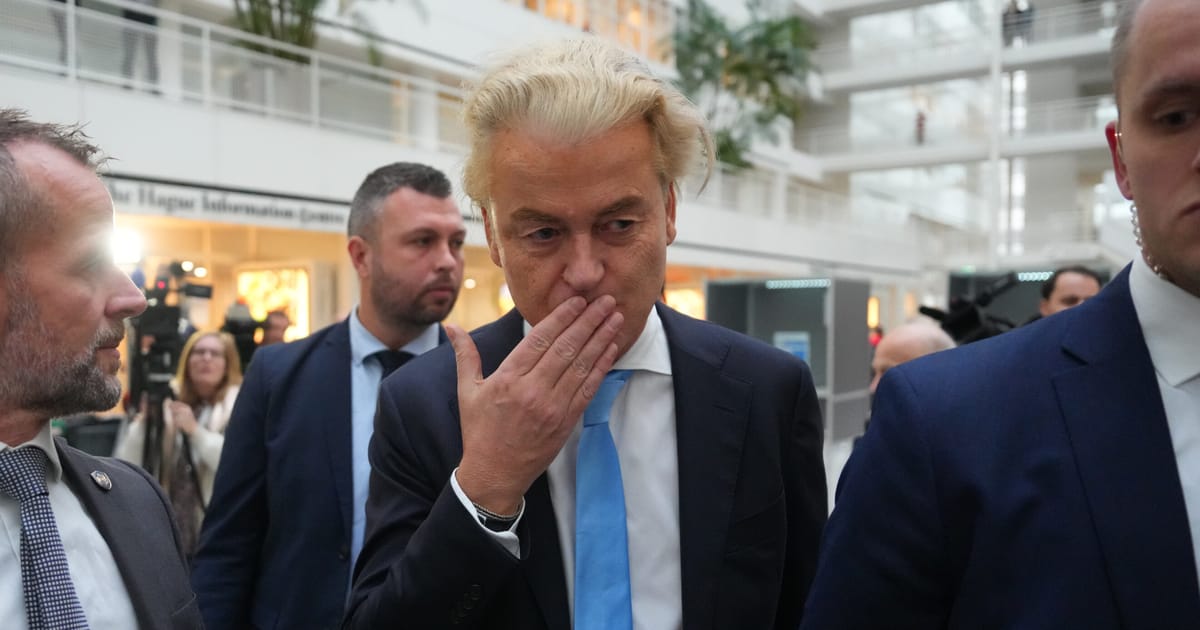The anti-Islam, euroskeptic radical Geert Wilders is projected to be the shock winner of the Dutch election.
In a dramatic result that will stun European politics, his Freedom Party (PVV) is set to win around 35 of the 150 seats in parliament — more than double the number it secured in the 2021 election, according to exit polls.
Frans Timmermans’ Labour-Green alliance is forecast to take second place, winning 25 seats — a big jump from its current 17. Dilan Yeşilgöz, outgoing premier Mark Rutte’s successor as head of the center-right VVD, suffered heavy losses and is on course to take 24 seats, 10 fewer than before, according to the updated exit poll by Ipsos for national broadcaster NOS.
A win for Wilders will put the Netherlands on track — potentially — for a dramatic shift in direction, after Rutte’s four consecutive centrist governments. The question now, though, is whether any other parties are willing to join Wilders to form a coalition. Despite emerging as the largest party, he will lack an overall majority in parliament.



In a republic*, ftfy. Republics and majority rule in general are not at all so democratic. The vast majority of the population has entirely no input in government.
Republic, you say? *King Willem-Alexander has entered the chat*
Does he have any effective political power?
not until he forms a coalition
Wait what? In the Netherlands the king forms a coalition? Or is it like in Belgium where the king appoints someone to try make a coalition and if he can’t then appoints someone else. Usually party heads of the parties in decreasing order of number of votes 😅 I guess the only real power the Belgian king has is censoring a party from initiating coalition talks.
oh i misread the comment you were replying to
no, the king has no real political power and constitutionally cannot have any
in fact, in practice he barely has a job in general and only exists to (?)
The Netherlands isn’t a republic and republic basically just means “not a monarchy”. Whether it’s democratic or not is an entirely different matter.
Hell, North Korea is a republic. So is Finland. You can be a democracy without being a republic and a republic without being a democracy.
A republic means a state with representative democracy. (Not strictly necessarily representative, but it’s hard to even imagine a State system with full democracy.)
Exactly, because a republic isn’t very democratic. What I’m saying is that representative democracy is barely democratic at all. Especially when using systems like majority rule. In most representative democracies today, the general public is barely if at all participating in the government of public affairs. I’m purposefully using the original meaning of the word democracy: government by the people or the people governing themselves. If the only way we can govern is by checking a box on a ballot twice a decade and that resulting in anywhere between 1 and 250 people having full authority over an entire country, I would not call that governing at all. And it shows that in most republics, policy enacted by their governments rarely represent what people actually want and care about.
There’s a few definitions but this is the first one in quite a few dictionaries and on Wiki
While Wikipedia mentions that power rests with the public (hence the name) instead of a monarch:
Those are two different things.
Would you argue that the head of the state of the Netherlands is the king? It being written to be so doesn’t mean it is so in practice.
Would I argue that the king is the head of the state of the Kingdom of the Netherlands? Obviously?
Sure that’s in paper. But does he head the state? North Korea is also a democratic republic if you go by the official definition…
I’m from Belgium, which is also a kingdom, but our king has absolutely no power. The state is headed by the federal government, not by the king, in practice. I would imagine that to be the case in the Netherlands too.
Yeah but they’re still democratic systems.
It’s terminology. I guess they’d be called so today, yes. They wouldn’t be called like that a few hundred years ago when the term democracy first became public. The word democracy actually has a very interesting history. At the time of the founding of the United States of America, the founding fathers were actually motivated in crafting the constitution of the republic by fears of democracy breaking out. The resulting constitution also never mentioned the word democracy in it.